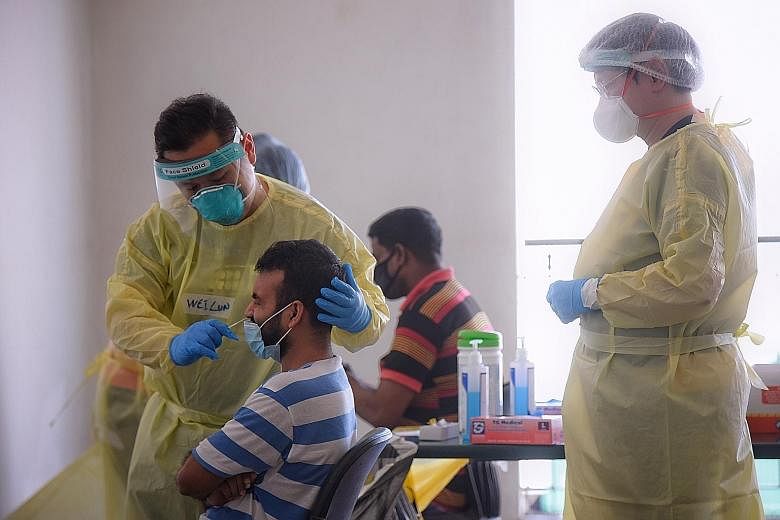To quickly detect and isolate asymptomatic Covid-19 cases among migrant workers, the Ministry of Manpower (MOM) and the Ministry of Health (MOH) have started piloting the use of antigen rapid tests, which can give results within 30 minutes.
The new tests will form part of the existing rostered routine testing (RRT) of workers, which has helped to pick up new infections among them.
Under the RRT, workers are already tested every 14 days using the more accurate polymerase chain reaction (PCR) test. However, it takes at least a day for the PCR results to come back.
The pilot programme, which started on Oct 18, involves some 1,000 workers staying in SCM Tuas Lodge dormitory.
It comes as agencies here work out ways to incorporate fast testing into Singapore's Covid-19 response, including having such rapid tests available at certain mass events in the coming months.
Yesterday, Dr Lam Meng Chon, medical director of MOM's Assurance, Care and Engagement (Ace) Group that supports migrant workers and dorm operations, said this "helps to break the chain of transmission and reduce the risk of spread within the dormitories".
He added that by increasing the testing frequency, they would be able to pick out positive cases that might have otherwise slipped through.
The antigen rapid test will be used as an additional test on the seventh day of the 14-day RRT cycle, to complement the PCR test on the 14th day. This means that workers will have to take a Covid-19 test every seven days during the pilot.
Results from the antigen rapid tests are out within 30 minutes. A nasal swab is used to take a sample from the lower part of the nose.
Such tests, however, are less accurate than PCR tests, which are currently used to definitively confirm coronavirus cases and remain the most accurate tests available today.
Dr Lam noted that because of the antigen rapid test's lower specificity, a positive case is just a suspected Covid-19 case. Those who test positive will be isolated immediately and sent for a confirmatory PCR test.
Fewer close contacts will need to be quarantined, minimising work disruptions for workers and employers.
The pilot will run for a period of four weeks before its effectiveness is assessed. If it works well, it may be scaled up and expanded to cover more migrant workers.
Ms Koh Guat Siew, vice-president of human resource operations at Sembcorp Marine, said the firm can take follow-up action sooner if the test results are out earlier. "We can be assured that once a worker goes back to work, the risk is minimal," she added.
Quality control technical engineer Sikder Masud, 34, who took the rapid test last week, said: "With the test, I can get the results faster and it is less uncomfortable. I also feel safer when I go to work."
Last Tuesday, MOH said that pre-event testing for Covid-19 will be a requirement at certain mass events in the months ahead. Participants will have to take an antigen rapid test and obtain a negative result before they can gain entry.
LISTEN TO HEALTH CHECK PODCAST
SEE TOP OF THE NEWS












